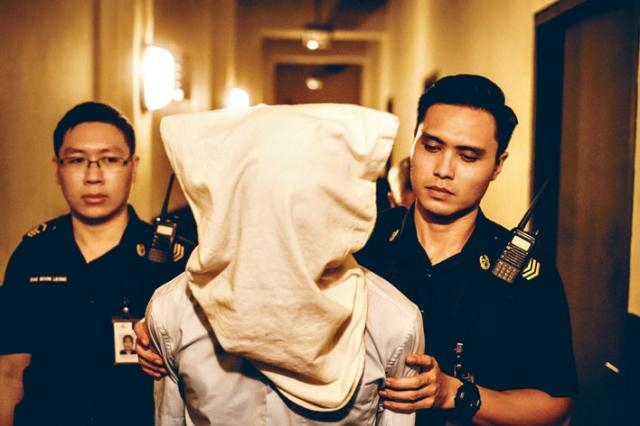I recently watched the
33-year-old renowned Singaporean filmmaker Boo Junfeng’s celebrated film Apprentice at the 2017 Singapore Film Festival, held at Siri Fort Auditorium, New Delhi. I was
invited by the Singapore High Commission to conduct a discussion on the film on
the second day of the festival. Apprentice was the official selection in the Un
Certain Regard section at last year’s Cannes Film Festival. Organized by the
Singapore High Commission, in partnership with the Directorate of Film
Festivals, India, the three-day festival also screened other Singaporean films
like Yee Wee Chai’s That Girl in a Pinafore, K Rajagopal’s A Yellow Bird,
Eva Tang’s The Songs We Sang, and 7 Letters—an anthology by seven of Singapore’s most renowned filmmakers. The
festival also included a special feature to promote the young and upcoming filmmakers
from both Singapore and India titled ‘Step Into My World’ wherein Supriya Rohit,
the Artistic Director of Cinedarbaar, moderated a dialogue with Daljit Ami (India) and Kang Sheng Tang (Singapore)—the two shortlisted candidates for a
reciprocal filmmaker’s residency programme.
Apprentice is the story of a
young correctional officer on his way to becoming a chief executioner at a
maximum security prison in Singapore. The film presents a humanistic take on
the lives of executioners, who, ostracized by the society, are forced to live
in seclusion. Apprentice revolves around the theme of Capital Punishment. The subject
of death penalty is not new. There are ample examples in both cinema and
literature of storytellers trying to draw our attention to the complexities
associated with Capital Punishment. The first and foremost name that comes to
mind is that of the Russian author Fyodor Dostoevsky whose masterwork The Idiot presents a formidable critique
of state-sanctioned murder. Then there is the American author Truman Capote’s groundbreaking
nonfictional work In Cold Blood. The
master Japanese filmmaker Nagisa Oshima’s Death by Hanging is another telling work that deals with the theme of Capital
Punishment. But these works invariably unfold from the perspective of the convict.
A couple of exceptions that come to mind are the Spanish maestro Luis Berlanga’s
film The Executioner and Stephen King’s
novel The Green Mile which was later
adapted by Frank Darabont into a movie of the same name. While the former is a
satire, the latter has certain elements of magic realism. Both these works are
somewhat devoid of the realism that’s needed to tackle a subject as grave as
Capital Punishment. It is here that Boo Junfeng’s Apprentice stands out in that it offers a meditative take on the
pain, suffering and contempt that the executioners have to deal with because of
their profession.
Apprentice doesn’t rely on
fancy dialogues or gimmicks but it rather uses powerful imagery to narrate a
heartbreaking story. We have no heroes or villains but men who know what it
takes to complete their dreaded job. The hangmen are no different than any
other man and yet they are often seen as heartless entities by the society. Boo’s
film not only humanizes the hangmen but also succeeds in making us more aware
about the perils of death penalty. Singapore has a very harsh criminal justice
system and is known for its extensive use of Capital Punishment. Now, these
laws bear a colonial hangover and perhaps require some reformation. Apprentice
is an attempt to draw our attention towards the atrocious colonial laws that
are still treated as gospel in a number of countries across the world. Even in
India we are yet to scrap the arcane colonial laws that continue to drive our
judicial system. Indian filmmaker Chaitanya Tamhane’s film Court
brilliantly touches upon this issue.
Overall, Apprentice is a
thought-provoking film that draws our attention to issues that often go
neglected. It took Boo Junfeng about five years to complete this films which included
an extensive research during which we interviewed executioners, convicts and
their families as well as imams and priests who had helped the convicts with
their last prayers before they were hanged. The grand reception that Apprentice has received across various
international film festivals is a testament to the film’s universal appeal.
Here is a film that doesn’t try to make any loud statements. Without being
preachy it still manages to leave a powerful impact on the viewer. The credit
ultimately goes to Boo’s evocative storytelling for creating an immersive experience.
Apprentice not teaches us a thing or two about the prison procedures but it also
makes us learn to appreciate life more than ever.
Readers, please feel free to share your opinion by leaving your comments. As always your valuable thoughts are highly appreciated!
Apprentice - Official Trailer (YouTube)
People who liked this also liked...





0 comments:
Post a Comment
Thanks for sharing for valuable opinion. We would be delighted to have you back.